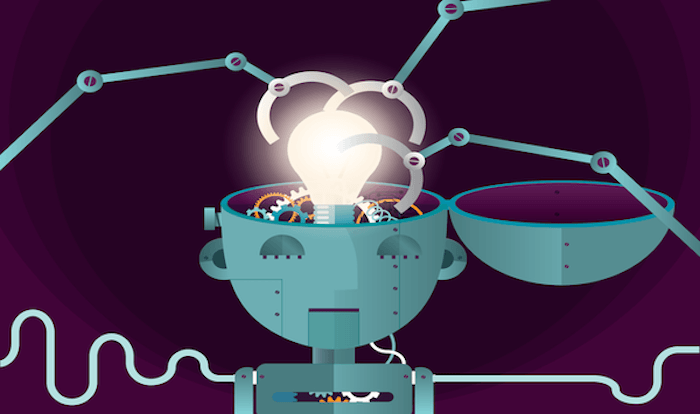We all know that times change.
In the ‘90s people were still focused on finding better ways to sneak ads in through your office fax machine. But as the internet grew larger, computers became faster, and code got smarter, we saw the entire landscape shift.
You now have banner ads and email marketing and data to analyze. These technological advancements quickly grew so big that internet marketing became its own animal and gave rise to dedicated digital marketing agencies to handle this new and complex world.
A world that keeps getting more complex.
Artificial intelligence has been receiving a lot of attention lately as it inspires both the dreams and nightmares of people around the world. Today, almost all of us interact with AI on a daily basis. We all use machine learning algorithms online. We exchange messages with chatbots that are starting to get eerily human-like. We have self-driving cars on the road and robots built solely to train other robots.
Of course, all these advances come with some risks …
Sure, there’s the dystopian Skynet scenario. But people also have much more immediate concerns like job losses and increased consumer expectations as businesses begin implementing AI strategies. Many marketers and writers think we’re safe from this automation revolution. If that’s you, you need to reconsider because AI is knocking on your door too.

Here’s how AI will impact content marketing in the coming months and into 2018. The more you know, the better you’ll be able to leverage the technology as it rapidly improves over the next 12 months and beyond.
Content Creation
Let’s start with the elephant in the room. Can artificial intelligence really replace humans when it comes to creative pursuits, like writing?
Answer: Yes. They already have.
Companies like the Associated Press and ESPN have been using Natural Language Processing (NLP), a type of artificial intelligence, to publish entire stories including sports recaps and stock market movement. And Narrative Science has been developing B2B solutions that offer this tool to other businesses such as MasterCard, Groupon, and USAA.
For NLP to work, you feed the program existing content to train it to understand the topic. Once it does, you start inputting sports results or stock tickers. And there you go.
It’s important to emphasize that this has been going on for nearly a decade already. But it won’t be long until programs are able to write quality content on more complicated topics like those you cover.
Content Strategy
If you’re using a CRM to track leads or manage subscribers, you’re probably already using some AI in your marketing strategy. CRMs like Salesforce are starting to implement massive AI upgrades to their systems to maximize marketing ROI.
Let’s take a look at some examples.
Detailed Segmentation
You’re likely already segmenting your customers as best you can, but now machine learning allows us to do it even better. Instead of relying on first or last source attribution, programs will be able to use every interaction as data to organize and label readers.
This not only helps you build better segments, but it gives you better insight into those segments once you’ve established them.
Content Suggestions
Once AI has developed segments, it can begin to recommend content titles and even descriptions to engage that segment better. It knows what people respond to, where leads are getting stuck in the funnel, and can even monitor what the competition is doing.
While a human will likely still take over for the writing, you won’t be able to use “I’m thinking about new content pieces” as an excuse for staring out the office window anymore.
ALSO READ: How Segmentation Improves Email Marketing
Personalization
When you have a lot of information about your readers, you can take segmentation even further by personally interacting with customers through content. A great example of this is Facebook’s frequent auto-generated videos to celebrate anniversaries and special occasions.
https://www.youtube.com/watch?v=XUSWPC7J5B8
They developed a programmatic way to take the customer’s data and generate fresh content automatically. This is scalable personalization.
Lead Scoring
You may already be familiar with the concept of lead scoring. It’s a popular funnel strategy that assigns numerical values to each of your leads showing where they are in your pipeline. This lets you know what kind of content you should be sending their way. You can use that information to help your team know what to focus on in their blog posts and when to share a specific piece of existing content.
AI can identify purchase intent by analyzing the behavior of past converting customers and alerting your sales and marketing teams whenever a user is starting to behave like an ideal buyer.
Content Consumption
This final innovation may be a bit out of your control, but it’s important to understand how it works if you want to be on your content A-game.
Companies like Facebook and Google are investing hundreds of millions (maybe even billions) into developing better algorithms. The goal is to match people with more relevant content. And for the most part, that’s a good thing for all of us, consumers and marketers alike. It means less annoying, irrelevant, or low-quality content and fewer resources wasted talking to people who don’t care.
But because these programs are getting better and better at delivering personally tailored results to users, you’ll need to focus on creating more hyper-tailored content. It won’t be enough to write the best trout fishing guide anymore; you’ll need to write the best trout fishing guide for Mike the amateur angler from Montana.
This will affect every industry to a different degree. But as the cost of content creation goes down due to automation, the amount of good content online will increase quickly. The emphasis may switch from writing one-size-fits-all to generating several different versions of each piece to connect with different segments.
Final Thoughts
This past April, advertising agency NewBase interviewed more than 1,000 marketers around the world and asked them what technologies they plan to prioritize in the coming year. While it didn’t reach the top of the list, 30 percent of marketers said they would prioritize artificial intelligence this year — more than double last year’s response of 13 percent.

It’s not mainstream yet, which admittedly means that it isn’t easy and cheap either. But it also means that you have an opportunity to get your foot in the door first to learn the landscape and master the skills before your competitors follow Amazon’s lead and start dumping massive portions of their budget in AI development.
Eric Siu is the CEO of digital marketing agency Single Grain, which has helped venture-backed startups and Fortune 500 companies grow their revenues. He’s also the founder of marketing podcast Growth Everywhere and hosts the Marketing School podcast with Neil Patel.





